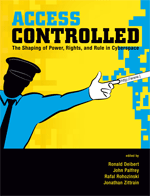Access Controlled
Cyberspace is being shaped. This second volume from the OpenNet Initiative documents emerging trends and technologies as governments around the world seek to shape, limit, and control the Internet.
 The tectonic plates of cyberspace are shifting. As the global Internet expands in reach and ability to influence, governments are pursuing strategies to establish controls and policing over this domain consistent with national laws and values. These tendencies are evident in democratic as well as authoritarian states.
The tectonic plates of cyberspace are shifting. As the global Internet expands in reach and ability to influence, governments are pursuing strategies to establish controls and policing over this domain consistent with national laws and values. These tendencies are evident in democratic as well as authoritarian states.
Government intervention has become more pronounced and pervasive – and censorship and surveillance practices are on the rise. First-generation controls, typified by China’s “Great Firewall,” are being replaced by more sophisticated techniques that go beyond mere denial of information and aim to normalize (or even legalize) a climate of control. These next-generation techniques include strategically timed distributed denial-of-service (DDoS) attacks, targeted malware, surveillance at key points of the Internet’s infrastructure, take-down notices, and stringent terms-of-usage policies.
Access Controlled updates and expands on the OpenNet Initiative’s 2008 volume, Access Denied. Six new chapters written by leading experts analyze trends and patterns shaping Internet controls worldwide. The volume presents six up-to-date regional reports and 29 country profiles based on ONI’s extensive infield research and technical testing.
Access Controlled was reviewed for the October 2010 edition of Science. That review is accessible online.
For more information and to download chapters from the book, visit the Access Controlled site.



